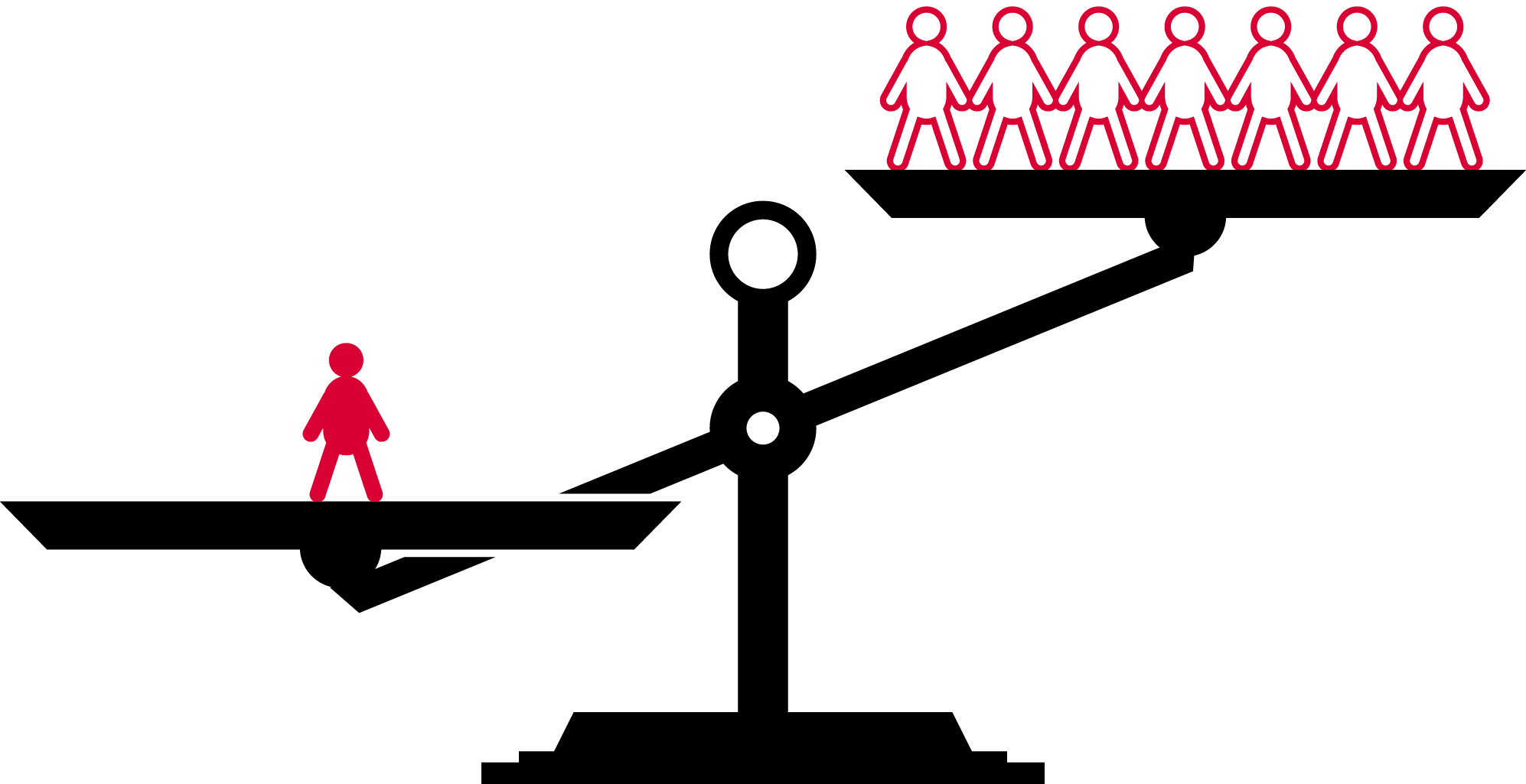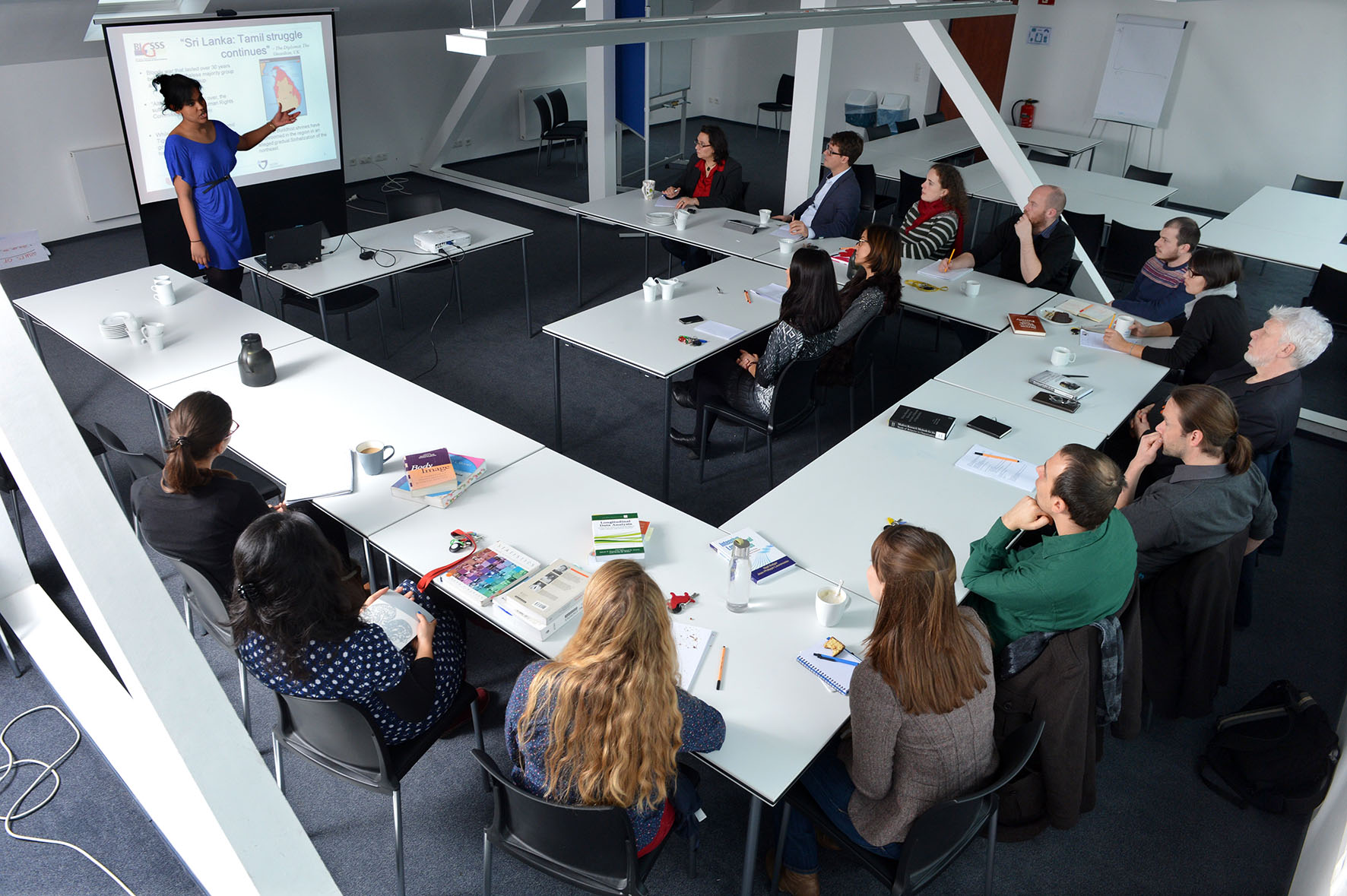Global Inequality, the Middle Classes and the Welfare State (GloWel)
Research Program
For the program "GloWel - Global Inequality, the Middle Classes and the Welfare State", BIGSSS was selected by the DAAD to host four international PhD students in its Graduate School Scholarship Programme (GSSP) starting their PhDs in 2021 and 202 (two each year).
 The GloWel program focuses on the interrelation between the development of global inequalities, global social policies, and the role of the emerging middle classes for social and political integration. Embedded in the vibrant Bremen social science environment, we are particularly interested in comparative perspectives on the Global South and North. The program has strong ties to Bremen’s CRC 1342 “Global Dynamics of Social Policy” and the national Research Centre for Social Cohesion.
The GloWel program focuses on the interrelation between the development of global inequalities, global social policies, and the role of the emerging middle classes for social and political integration. Embedded in the vibrant Bremen social science environment, we are particularly interested in comparative perspectives on the Global South and North. The program has strong ties to Bremen’s CRC 1342 “Global Dynamics of Social Policy” and the national Research Centre for Social Cohesion.
Global trends of rising economic inequality within most countries have triggered a shifting interest of inequality research from its causes to its consequences: How do contemporary societies cope with increasing economic and largely persistent social inequalities? This question has gained particular interests with the rise of right-wing populism and the challenges of liberal democracies due to inequality, populism and new form of political communication. The sociological research at Bremen particularly focuses on the role of middle classes in strengthening or weakening social and political integration in welfare societies – with a particularly interesting and promising comparative perspective on ‘emerging’ middle classes.
Global trends of rising economic inequality within most countries have triggered a shifting interest of inequality research from its causes to its consequences: How do contemporary societies cope with increasing economic and largely persistent social inequalities? This question has gained particular interests with the rise of right-wing populism and the challenges of liberal democracies due to inequality, populism and new form of political communication. The sociological research at Bremen particularly focuses on the role of middle classes in strengthening or weakening social and political integration in welfare societies – with a particularly interesting and promising comparative perspective on ‘emerging’ middle classes.

Faculty Associated with the Program
All doctoral education at BIGSSS is geared at a good fit between the Ph.D. projects of our fellows and the research focus areas of the faculty involved. We believe that doing a Ph.D. is most fulfilling for all parties if there is a mutually shared and genuinely scientific interest in the projects. Therefore, all applicants to the GloWel program have to demonstrate a broad thematic fit between the dissertation proposal and the corresponding Principal Investigator's outlined research interests as listed below.
Prof. Dr. Hilke Brockmann
As sociologist and demographer, Professor Brockmann is interested in innovative research on social inequality particularly among important social groups – the rich, migrants, the elderly, women. Beyond objective inequalities, she also studies subjective well-being and happiness.
Potential research question include:
- Can societies afford billionaires or how much inequality should societies tolerate?
- What can we learn from social media data?
Prof. Dr. Olaf Groh-Samberg
Professor Groh-Samberg welcomes dissertation proposals on changing class structures in countries of the global south. He is particularly interested in the relation between economic, cultural and political dimensions of class formation, and specifically on emerging middle classes.
Prof. Dr. Sebastian Haunss
Professor Haunss welcomes applications that address inequalities within and between health systems in the Global South in a longitudinal or comparative perspective. Possible research questions could be:
- Which policies have increased/decreased inequalities in national health systems (in country X / in region Y / in time period a to b)?
- Have interventions from international organizations increased or decreased inequalities in national health systems (in country X / in region Y / in time period a to b)?
- Do colonial legacies still have an influence on influences in/between health systems?
Prof. Dr. Torben Klarl
Professor Torben Klarl welcomes theoretical grounded applications that focus on the social and economic consequences of income and wealth inequality both with a subnational and national perspective. Knowledge in modern empirical methods (panel and time series econometrics) and a sound knowledge using dynamic optimization techniques would be desirable. Possible research questions that could be addressed are:
- The consequences of pandemics (such as Covid-19 or Spanish flue etc.) for wealth and income inequality. Proposals that work with historical data are from particular interest.
- Pandemic shocks, climate change and income inequality. Proposals that focus on developing countries are very welcomed.
- Human capital inequality, life expectancy and automation: Implications for the design of an environmental policy.
Prof. Dr. Patrick Sachweh
Professor Sachweh welcomes applications that investigate the social and political consequences of the recent dynamics of global income inequality, during which rising inequality within countries and decreasing inequality between countries have interacted to produce distinct winners and losers. Possible research questions are:
- What are the conditions and prospects for global economic solidarity? Are citizens of citizens in the Global North willing to support redistribution to the Global South? How does this differ along lines of class, gender, ethnicity etc.?
- Can we observe a political cleavage between cosmopolitan upper-middle classes and nationalist lower-middle classes in Western industrial societies?
- What is the role of the emerging middle classes for welfare state development and political integration in the Global South? Are these new middle classes arbiters of social protection and democracy?
Prof. Dr. Simone Scherger
Simone Scherger’s research focuses on the interplay between social policy and individual life courses. She is particularly interested in applications dealing with the question of how different strata within the middle classes (for example lower strata threatened by downward mobility in contrast to well-off strata) deal with the increasingly complex challenges posed by the welfare state, and which consequences this has for social security in individual life courses. Approaches studying the systematic differences between welfare provision in different countries, and its functional equivalents (e.g. the family), are particularly promising.
Potential research focuses related to the following questions:
- How are social risks (e.g. of old age poverty and long-term care) perceived within different strata of the middle classes?
- Which comprehensive strategies result from these differing perceptions and how are they embedded in class-specific lifestyles and practices? How do these strategies combine (non-)reliance on state measures (state pensions etc.) with market-based and ‘private’ strategies (private insurance, but also reliance on family, investment in real estate or continued employment in old age)?
- How do both perceptions and strategies depend on the concrete welfare state context, for example, how do they differ between mature and developing welfare states?
Prof. Dr. Wiebke Schulz
Ph.D. projects supervised by Professor Schulz should look at the program focus within the following perspectives:
- Technological change / labor market inequalities:
- gender inequalities,
- employment careers or
- eductational inequalities.
- Family and intergenerational reproduction of inequalities:
- inequalities within and between families,
- education, cognitive and non-cognitive skills and
- family relations.
Prof. Dr. Tobias ten Brink
Professor ten Brink welcomes applications that investigate social policy dynamics and inequality in large emerging economies such as China, Brazil, and India. In particular, the social results of extensive social policy reforms of the last decades shall be scrutinized.
Possible research questions are:
- Does the expansion of welfare regimes in large emerging economies serve to combat poverty, inequality and to avoid the “middle income trap”? To what extent do factors such as gender, migration status or ethnicity influence the results of social policy?
- How can we account for legitimation and political stabilization effects of social policy in authoritarian states and/or defective democracies? In particular, what is the role for the emerging middle classes in this process?
Prof. Dr. Michael Windzio
Professor Windzio welcomes applications that investigate the conditions and consequences of ties in social networks, in particular with respect to culture, practices, and ethnic-social boundaries.
- How can we explain ties in social networks, or segregation of networks, along group boundaries? How do these boundaries differ along lines of class, gender, ethnicity, culture etc.?
- How can we explain ethnic and social group boundaries and social/cultural distance at the group-level? How can we describe and measure global and local cultural differences?
- What are the cognitive and emotional dispositions for strong ties in networks?
